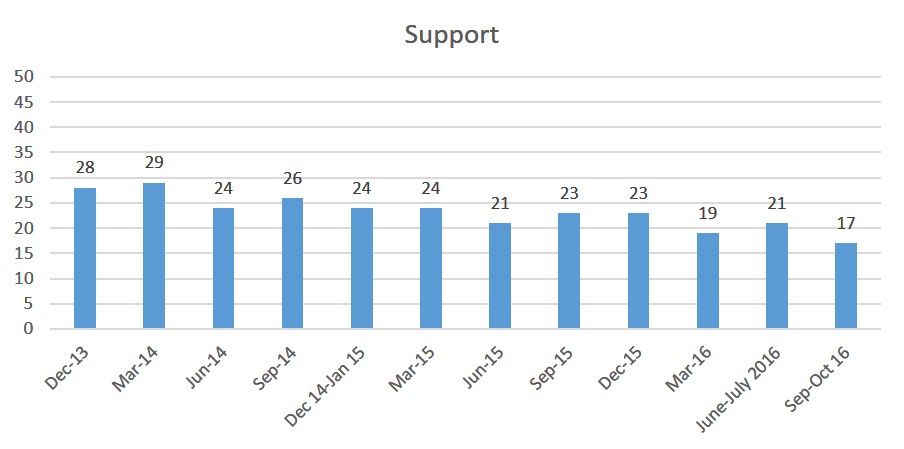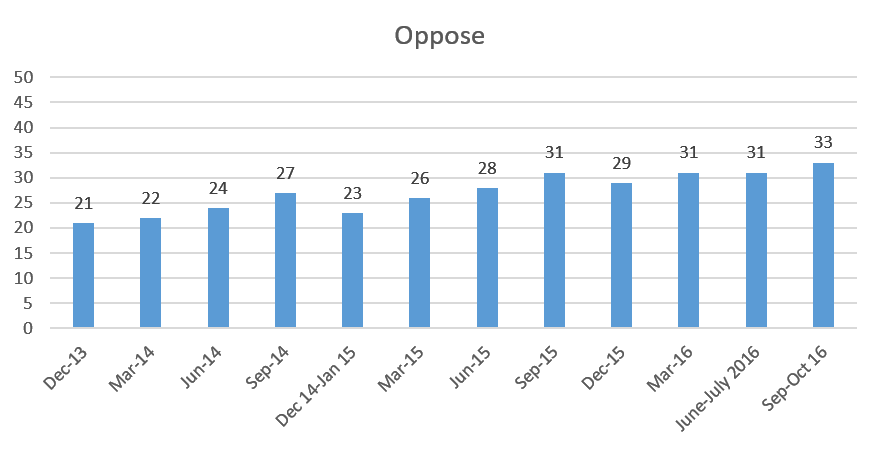
Opposition to fracking for shale gas has risen to a record high and support is at the lowest level so far, according to a government survey of public attitudes.
The latest findings from the quarterly Wave tracker survey, published this morning, put support for fracking at 17%. This is down from 21% in the previous survey carried out in June and July.

Opposition to shale gas now stands at 33%, up from 31% in surveys in March and June-July.

The survey was carried out before the government’s announcements on Cuadrilla’s appeals over shale gas planning applications in Lancashire.
The gap between people who support and people who oppose is now at its biggest since the survey began asking questions about shale gas and fracking in December 2013.

The survey found people who were strongly opposed to shale gas fracking fell to 11% from the previous high of 14% in March and 13% in June-July 2016.

People who strongly supported shale gas remained unchanged on the previous survey at 2%, but down from 4% in March 2016.
Awareness of shale gas reached its highest level so far at 79%, up from 77% in the previous survey. People who have never heard of shale gas continues to fall. The latest survey put this at 21%, the lowest recorded so far.

Half the people who took part in the survey either said they were neutral about shale gas (48%) or they did not know (2%). The proportion of people who are neutral about shale gas has continued to climb since March 2015, but is still just below the peak of 49% in the survey of December 2014/January 2015.
Reasons for support and opposition
The survey said the most common reasons for supporting shale gas fracking were:
- Need to use all available energy sources – 37%
- Good for local jobs and investment – 32%
- Reduce dependence on coal and oil – 29%
The most common reasons for opposing shale gas were:
- Loss or destruction of the natural environment – 54%
- Too much risk and uncertainty to support at present – 31%
- Not a safe process – 28%
Methodology
Wave 19 was carried out by TNS BMRB for the Department of Business Energy and Industrial Strategy. Fieldwork was carried out between 28 September 2016 and 2 October 2016 using face-face interviews at home with a representative sample of 2,080 households in the UK.
The Communities Secretary, Sajid Javid, announced on 6 October 2016 that he was overruling Lancashire County Council’s refusal of permission for fracking at Preston New Road and reopening the public inquiry for fracking at Roseacre Wood.
Links
Categories: Research

Research in the past has shown the more people learn about fracking the more likely they are to oppose fracking. As awareness grows, opposition grows.
With Labour and the Lib Dems now pledging to ban fracking, a moratorium in Scotland and Wales – when will this government, which is looking increasingly isolated in its support for fracking, get the message?
With no social licence and a lack of political support, this industry cannot operate successfully. There are even Conservative MPs that have publicly stated they will oppose their own party on fracking.
You cannot force an industry on the public against their wishes, that is no way to operate a successful business.
The global commitment to reduce fossil fuel use – means that the technology and changes to the grid will come and quicker than some, including the government and industry, realise or are prepared to acknowledge. Granted it is a huge change and it will not happen overnight but we are on the path of change and even with this government’s attitude to renewables – 25% of our electricity came from renewables and this will continue to grow.
There are sufficient hydrocarbons already available in the world without fracking the UK.
Those of us opposed to the exploitation of shale oil and gas, be it fracking, acidization, stimulation or whatever the industry or government deem to call it, realised long ago that spreading awareness of the related negative issues was going to be difficult. The almost total lack of reporting on such negative issues in the main stream media has been staggering. But we always knew that once the message got out there more and more people would oppose it.
There is one simple equation that the pro shale industry and its supporters fail to comprehend, possibly intentionally, that the more energy we generate from renewables means a reduction in the energy we need to obtain from fossil fuels. We understand that stopping the use of fossil fuels today is not possible. But we must all further the cause of fossil fuels if we are to minimise the adverse impact of their use on our climate. Their use must also be questioned in industries other than energy; more research is needed. The head in the sand approach of government is criminal.
It is interesting to note that the research was done BEFORE the government overturned the LCC refusal.
Cuadrilla and their friends must truly be dreading the results of Wave 20 when the impact of that will filter through!
So the reasons given for opposition are
—-Loss or destruction of the natural environment – 54% Yet there is no evidence of this happening. Frack FreeRyedale for instance had to withdraw their claims of ‘industrialisation’ when I challenged that at the Advertising Standards Authority. There is no evidence that it will happen.
—-Too much risk and uncertainty to support at present – 31% and —–Not a safe process – 28% Yet all of the Engineering experts who have looked at this say it is a low risk activity, and planning ensures that all the safety aspects are in place.
Friends of the Earth have a lot to answer for, as they have been the ones deliberately spreading misinformation. Fortunately that is in the process of being exposed. I am still waiting for the ASA to contact me for that irrefutable evidence that fracking is risky. http://www.bbc.co.uk/news/uk-england-lancashire-34570974
Well Ken – it’s interesting that the only firm ruling that the ASA have made to date is the one they made against Cuadrilla isn’t it?
https://www.asa.org.uk/Rulings/Adjudications/2013/4/Cuadrilla-Resources-Ltd/SHP_ADJ_203806.aspx#.WBI29ty1wSU
Even more interesting is the fact that Cuadrilla escaped censure here on one point – where their statement “”Some critics have suggested that the area would be blighted by densely packed, unattractive developments in the future, if we moved to production stage. This would not be the case” was questioned, by reassuring the ASA that “If it were to proceed it could entail in the order of 10–20 development pads across the 1200-km2 area of the licence, with each pad approximately the size of a football pitch.”
Of course having wriggled out of that one we now know that they plan around 100 wells in their licence area and that each well will be the size of 2-3 football pitches.
Eric Vaughn of Cuadrilla admitted to 80-100 well pads in 2015 in a letter here http://www.lep.co.uk/news/your-say/reader-s-letters-monday-june-15-2015-1-7309320, saying “between 80-100 well pads could be installed over Cuadrilla’s total 1,200km2 Bowland exploration area
and the UKOOG website makes it clear that a well pad will be the size of 2-3 football pitches (two to three hectares in size).
So it seems Ken that we really can’t trust what the industry says one minute because they say what suits them at the time and change their tune at the drop of a hat.
As to spreading misinformation – you have a bit of from there too don’t you? http://www.refracktion.com/index.php/red-faces-not-reds-under-the-bed/
Refracktion – a point to note – 100 wells can be sunk from 10 to 20 pad sites. They use a cluster drilling techniques these days (5 to 10 or even more wells per pad). Pipes radiate away from the pad then turn to run parallel (horizontally) for 2km or more either side of each pad.
The best and most comprehensive description of the whole process that I’ve come across is in the address given by Dr Ingraffia to a town in upstate New York. He helped invent fracking so he knows all about – but has become appalled by the over extended processes now employed – beyond safe and sustainable limits. This is a poorly shot video, with and incredibly long winded introduction (I suggest skipping straight to 13:30), but see Ingraffia telling it like it is here: https://www.youtube.com/watch?v=-h06KWMkNKY
PS the industry promoters loathe him for exposing the full story.
My bad Philip – “they plan around 100 wells in their licence area” should of course have read “they plan around 100 well pads in their licence area”. With 40-60 laterals a pad (as Cuadrilla are reported to have claimed they can do) that’s an awful lot of wells to be drilled isn’t it?
Ken’s ‘there is no evidence’ cry is like a record player stuck in the groove. Bears no relation to reality… therapy needed.
Ruth, I wonder if you will be giving this poll (http://pressreleases.responsesource.com/news/91837/79-would-prefer-uk-shale-gas-rather-than-imported-lng/ ) the same amount of attention as the government poll?
Why would she? I’m sure Ruth can tell the difference between a properly undertaken survey and one with a ludicrously weighted question.
And just to be clear – the heavily weighted question is not reflected in the heading of the Press Release you cite , which claims “79% would prefer UK shale gas rather than Imported LNG”. The question actually asked was limited to the Middle East.
“If you had gas central heating, would you prefer your home to be heated by safely produced low GHG shale gas from the UK (that pays production tax) or imported LNG shipped from the Middle East (that pays no tax on production)?”
They seem not to want to acknowledge that LNG will also be imported fro other countries like the USA. Can we guess why children?
As regards (presumably UK) production tax v no (presumably UK) production tax It would appear from a quick search that the UK does in fact charge import VAT, customs duty and excise duty on imported hydrocarbons. Can anybody clarify or provide more detail as this is quite an interesting point.
(edited by moderator)
Hi Hballpeeny Thanks for pointing this out. I’ve been in touch with the company which commissioned it. I’m still trying to find out the exact wording of the question and the methodology for recruiting participants. When I know that I will report on the poll. Best wishes, Ruth